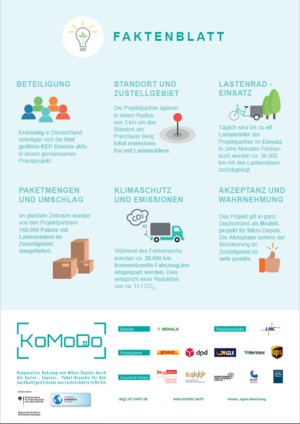KoMoDo-Pilot Study (Berlin, Germany)

Area: urban
Date implemented: June 2018
How long from concept to implementation: 1 year
Relation between efforts undertaken and benefits achieved: good
What was done and how: A micro-depot (managed by a neutral company) was cooperatively used by the five biggest German package delivery services (DHL, DPD, GLS, Hermes, UPS) to make the last leg of the delivery via cargobike. Service providers chose to continue using the depot for half a year after the pilot project, and locations for future micro-depots are being actively scouted.
Why it worked to 'fast track' the innovation/measure: The depot was continually optimised during the first year to deliver the infrastructure necessary to allow a cost-effective use of cargo bikes.
Lessons learnt: Locations for micro-depots are dependent on a number of factors, including number of local deliveries, distance between delivery stops, delivery structure of each company, local road network, cost of managing the depot (rent etc). Non-delivered packages needed an additional trip back to the main depot, which led to extra costs. Lower cost of usage and higher drop rate achieved using cargo bikes reduced costs. A mix of cargo bikes and electrical vans would likely be the best sustainable solution, as large packages or a large volume of packages to the same location are not realistic to transport via cargo bike. Micro-hubs increase the economic performance of cargo bike logistics when placed within a short distance of a high number of delivery destinations. Ideally, distances should be up to 3 kilometres. It is important to use the model of an independently managed micro-hub with a high degree of flexibility in terms of organising the trips to accommodate the needs of different courier, express and parcel service providers.
Tips for replication: A main factor for success is locating an efficient place for the micro-depot. Here the city officials can facilitate by actively supporting the search for locations. Use of the micro-depot by several different companies is efficient in terms of time and ressources in regards to finding a location and communicating with local residents. Provide supportive framework conditions for cycle deliveries; make cycle delivery the first choice for municipal deliveries; when tendering for logistics, include cycle delivery as a preferred option. Favour cycle logistics in the procurement procedures of municipalities; address the threat from lorries by limiting access to the inner city.
Sources or links:
- https://www.komodo.berlin/
- https://smart-city-berlin.de/en/projects-list/project-detail?tx_news_pi1%5Bnews%5D=464&cHash=03122da787fa6b055c4e09132ccdfe82
- https://www.eltis.org/resources/case-studies/large-scale-introduction-cargo-bikes-game-changer-european-cities/
Date implemented: June 2018
How long from concept to implementation: 1 year
Relation between efforts undertaken and benefits achieved: good
What was done and how: A micro-depot (managed by a neutral company) was cooperatively used by the five biggest German package delivery services (DHL, DPD, GLS, Hermes, UPS) to make the last leg of the delivery via cargobike. Service providers chose to continue using the depot for half a year after the pilot project, and locations for future micro-depots are being actively scouted.
Why it worked to 'fast track' the innovation/measure: The depot was continually optimised during the first year to deliver the infrastructure necessary to allow a cost-effective use of cargo bikes.
Lessons learnt: Locations for micro-depots are dependent on a number of factors, including number of local deliveries, distance between delivery stops, delivery structure of each company, local road network, cost of managing the depot (rent etc). Non-delivered packages needed an additional trip back to the main depot, which led to extra costs. Lower cost of usage and higher drop rate achieved using cargo bikes reduced costs. A mix of cargo bikes and electrical vans would likely be the best sustainable solution, as large packages or a large volume of packages to the same location are not realistic to transport via cargo bike. Micro-hubs increase the economic performance of cargo bike logistics when placed within a short distance of a high number of delivery destinations. Ideally, distances should be up to 3 kilometres. It is important to use the model of an independently managed micro-hub with a high degree of flexibility in terms of organising the trips to accommodate the needs of different courier, express and parcel service providers.
Tips for replication: A main factor for success is locating an efficient place for the micro-depot. Here the city officials can facilitate by actively supporting the search for locations. Use of the micro-depot by several different companies is efficient in terms of time and ressources in regards to finding a location and communicating with local residents. Provide supportive framework conditions for cycle deliveries; make cycle delivery the first choice for municipal deliveries; when tendering for logistics, include cycle delivery as a preferred option. Favour cycle logistics in the procurement procedures of municipalities; address the threat from lorries by limiting access to the inner city.
Sources or links:






